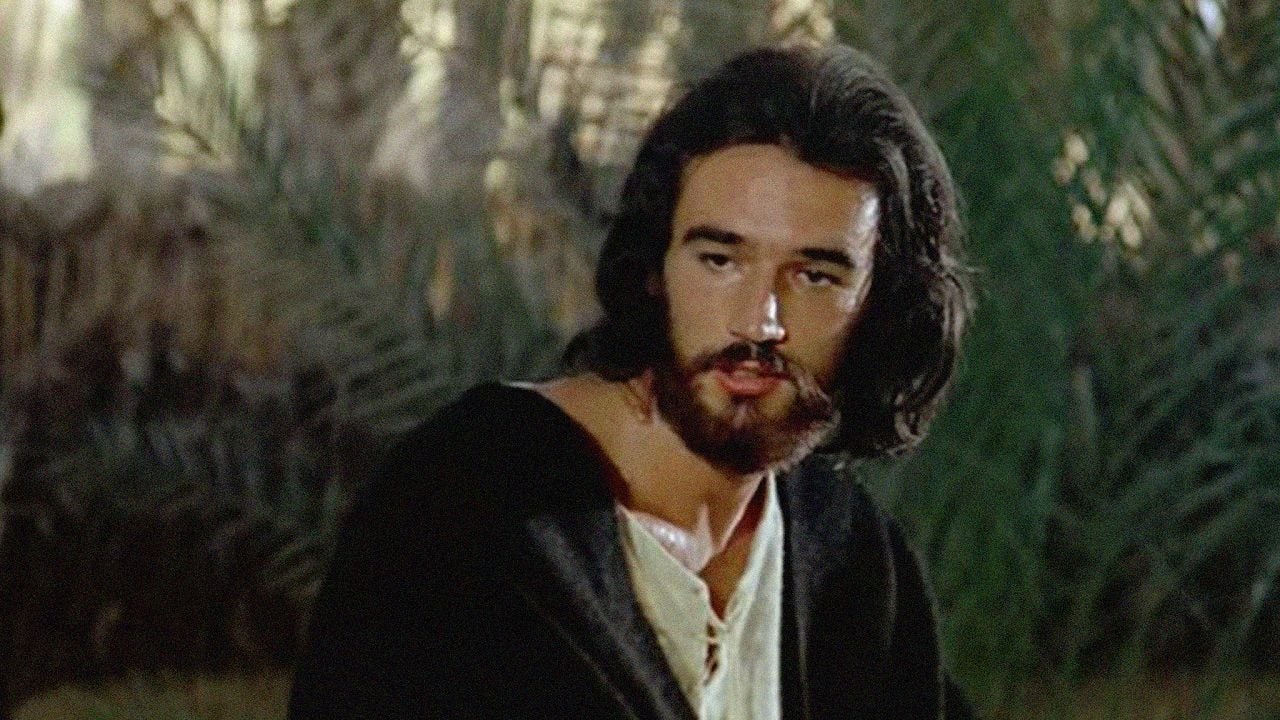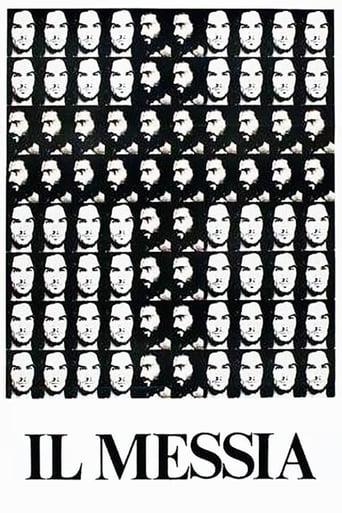

Released several years after his death, Roberto Rossellini's "The Messiah" is arguably one of the two most interesting films made about Jesus Christ, the other being Pier Paolo Pasolini's "The Gospel According to St. Matthew" , which paints Christ as a proto-Marxist and radical, social activist.Oddly, though Rossellini made many excellent "spiritual films" - see "The Flowers of St Francis" - the tone of "The Messiah" is closer to his 1971 film "Socrates" and his 1972 film "Blaise Pascal", Rossellini (an atheist) painting Christ as a quiet man of logic and reason.And so Rossillini's film is less about "the messiah" than it is about people whose needs for "a messiah" are so strong that they project godhood upon a Jesus Christ that is held at a distance and treated almost as a cipher. As such, Rossillini portrays Christ as a mild, almost timid rabbi, the most ordinary, quiet and uninspiring teacher imaginable. His Jesus, like Bresson's Joan of Arc, despite being immensely curious, also seems to want to disappear into obscurity.Of course, upon this blank slate Rossillini then shows a slew of followers blindly projecting their burdens, wants and needs. Rossellini's Christ is a resonant tabula rasa, and it is ultimately others who turn him into the son of God.In this regard, the followers of Jesus are turned into a subtle parody of irrationality, whilst those naysayers whom films typically show lambasting Christ as a conman and charlatan, are shown to be simply reacting against illogical, scripture twisting "Christians" who are, at worst, a civilly disruptive phenomenon, at best, a harmless bunch of simpletons.Christ is such a cipher in this film that, even on the cross, Rossillini chooses to leave out those iconic bits of Biblical dialogue which we're all familiar with ("Forgive them, Father, for they know not what they do!", "My Father, why hast Thou forsaken me?" etc). Instead, Christ just hangs there, a provocative question mark.Which is not to say that the film mocks Christians. No, Rossellini is up to something else. His film downplays the New Testament's miracles and more supernatural elements, and portrays Christs followers, both as a race and social class, as being abandoned, adrift, perpetually persecuted, direction-less and without a unifying leader. So hungry are they for direction and justice, that they almost conjure Christ himself out of the desert sands. He, they decide, will stand for them. In this regard the film draws parallels with Rossellini's Socrates, who is abused by an Athenian "democracy" which persecutes intellectuals, humanists and educators (intellectuals are similarly summoned and slain in "The Messiah"). The animosity directed towards Christ and Socrates then becomes a metaphor for the growing animosity toward social justice and critical thinking in both totalitarian and democratic societies, both of which are preoccupied with power, profit and so afraid of autonomy, knowledge and education. This, of course, echoes Rossellini's own life under Mussolini and post-fascism.So again we have Christ the liberator, not sent, but hungered for by a people who wish to be liberated from the despotic rule of a wealthy minority. Christ's murder then becomes the execution of a people's very dream for liberation. The film's last shot focuses on a sad, strangely empty sky. Christianity as an existential, even social project, dies here, and henceforth becomes a religious cult. Pessimistically, social justice is seen to be attainable in the area of values/beliefs/hopes etc, but not in the realm of real life. 8/10 - Worth one viewing.
... View MoreDubbed "the most Catholic of all film directors" by one critic, I guess it was only a matter of time before Roberto Rossellini tackled the life of Christ on celluloid. Ironically, this he did in what proved to be his last feature film which was, in itself, a follow-up to his TV mini-series ACTS OF THE APOSTLES (1969). That earlier work was interesting for treating little-known passages from the New Testament but, with an unhurried pace and a generally unassuming tone, the end result was decidedly meandering. Conversely, THE MESSIAH presents all-too-familiar events with the overall effect feeling lengthy still, yet distinctly more cinematic. That said, it starts off with the arrival of the Jews in the Promised Land and the appointment of their first king (Saul) before moving on to the life of Christ; actually, this is also one of the few films to show the famous incident in which Jesus is lost in the temple as a boy. Unsurprisingly, it doesn't stray much from the spirit or word of the Gospels: even so, in the throes of an agonizing death, Herod The Great (played by Vittorio Caprioli though his trademark flustered demeanor is downplayed by having his voice dubbed) is seen planning the annihilation of his own subjects akin to the practice of ancient Egyptian rulers! Incidentally, the rich and commanding voice of Christ himself is supplied by Enrico Maria Salerno a superb actor in his own right who had actually already handled the very same task in THE GOSPEL ACCORDING TO ST. MATTHEW (1964) which is effectively contrasted with the inconspicuous appearance of the young man who appears in the role (perhaps best approximating the Lothaire Bluteau of Jesus OF MONTREAL [1989]). This Messiah, then, is far removed from the striking good-looks of Jeffrey Hunter (KING OF KINGS [1961]) and Robert Powell (the Jesus OF NAZARETH [1977] TV mini-series) or the brooding power of Max von Sydow (THE GREATEST STORY EVER TOLD [1965]) and Willem Dafoe (THE LAST TEMPTATION OF Christ [1988])! Naturally, the bulk of the narrative is devoted to Christ's public life though no overdue emphasis is placed on the miracles he performed (these are mentioned but rarely seen) which also provides the film with its essential core since the latter section, revolving around the more commonly-depicted events of Jesus' trial (where Jean Martin, the French Colonel in THE BATTLE OF ALGIERS [1966], nonetheless makes for a fine Pontius Pilate), crucifixion and eventual resurrection are curiously skimped here! The subplot involving John The Baptist, however, is quite nicely handled; by the way, the only other recognizable face in the cast is that of Tina Aumont (even if her contribution amounts to no more than a few minutes of screen-time!) as the adulteress Christ famously pardons by denouncing her pursuers instead. The score is, once again, by Mario Nascimbene though it's not as prominent as his work on ACTS OF THE APOSTLES. On the visual side, the film seems closest to the contemporaneous Jesus OF NAZARETH yet the lyrical style and quiet dignity on display makes of THE MESSIAH a more than worthy companion piece to Pier Paolo Pasolini's aforementioned (and more renowned) THE GOSPEL ACCORDING TO ST. MATTHEW. With this in mind, while perhaps not the definitive film on the subject, it certainly emerges as an underrated achievement both among the myriad treatments (including those by such great directors as D. W. Griffith, Carl Theodor Dreyer, Cecil B. DeMille and Abel Gance) of Christ's life over the years and in Rossellini's own highly respected canon.
... View Morelike with late Pasolini, late Rossellini splatters one on the wall with such greatness. if he didn't have enough with descartes, Medici, pascal, Louis xiv, agostino, he went and made this enormous movie that put to ridicule the producers who gave him the money, who knowing what was at stake denied distribution it if it didn't have a god's omniscient narrator pasted upon. It wasn't distributed, naturally, and yet lies light years above politically correct (the dictionary meaning of 'political correctness') tripe like Gibson's or Zeffirelli's, even light years above Scorcese's and Pasolini's Evangelio.I say all those churches, with all that money they've taken from what legitimately should belong to philosophy or science or enjoying life or socialism or whatever, should learn to keep their money in their own propagandistic institutions and companies, should keep to their Hannah Barbera cartoons through which we've all been through in their indoctrination sessions, should continue to illegally sum numbers to their entity through baptisms at age 0, communions at age 10 and 'confirmations' at age 13... Because they won't convince anybody on equal terms, without manipulation, or financing intelligent projects like this one, which blew in their faces.this is rossellini at his best, like francisco giulare di dio, like Europa 51, like louis xiv...
... View MoreThis is an incredible movie, and for many reasons. No one in Hollywood could make such a low-key, authentic, and INTELLIGENT historic drama, especially considering subject matter. The first 20 minutes is a concise and brilliant history of the Jews. And then the life: It is the life of Jesus without the miracles. Like the priest in Open City (by Rossellini), R understands that the struggle is to live a good life. Most Biblical movies are a total insult. This is extraordinary. The actors are believable. It feels raw -- but controlled raw, if that makes sense. Again: authentic. Believable.
... View More